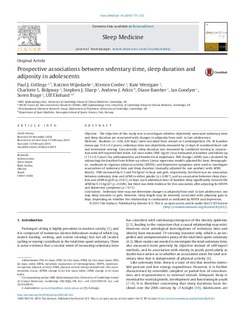Prospective associations between sedentary time, sleep duration and adiposity in adolescents.
Collings, Paul J.; Wijndaele, Katrien; Corder, Kirsten; Westgate, Kate; Ridgway, Charlotte L.; Sharp, Stephen J.; Atkin, Andrew J.; Bamber, Diane; Goodyer, Ian; Brage, Søren; Ekelund, Ulf
Journal article, Peer reviewed
Permanent lenke
http://hdl.handle.net/11250/2384105Utgivelsesdato
2015-06Metadata
Vis full innførselSamlinger
- Artikler / Articles [2119]
Sammendrag
Objective:
The objective of this study was to investigate whether objectively measured sedentary time and sleep duration are associated with changes in adiposity from mid- to late adolescence.
Methods:
Students (n = 504, 42% boys) were recruited from schools in Cambridgeshire, UK. At baseline (mean age 15.0 ± 0.3 years), sedentary time was objectively measured by ≥3 days of combined heart rate and movement sensing. Concurrently, sleep duration was measured by combined sensing in conjunction with self-reported bed times. Fat mass index (FMI; kg/m2) was estimated at baseline and follow-up (17.5 ± 0.3 years) by anthropometry and bioelectrical impedance. FMI change (ΔFMI) was calculated by subtracting the baseline from follow-up values. Linear regression models adjusted for basic demographics, moderate-to-vigorous physical activity (MVPA), and depressive symptoms were used to investigate associations of sedentary time and sleep duration (mutually adjusted for one another) with ΔFMI.
Results:
FMI increased by 0.5 and 0.6 kg/m2 in boys and girls, respectively, but there was no association between sedentary time and ΔFMI in either gender (p ≥ 0.087), and no association between sleep duration and ΔFMI in girls (p ≥ 0.61). In boys, each additional hour of baseline sleep significantly reduced the ΔFMI by 0.13 kg/m2 (p = 0.049), but there was little evidence for this association after adjusting for MVPA and depressive symptoms (p = 0.15).
Conclusions:
Sedentary time may not determine changes in adiposity from mid- to late adolescence, nor may sleep duration in girls. However, sleep length may be inversely associated with adiposity gain in boys, depending on whether the relationship is confounded or mediated by MVPA and depression.
Beskrivelse
Open Access funded by Medical Research Council.
Under a Creative Commons license.
